There is a simple regex pattern that detect IBAN in a text (including specific country formatting ?)
Actually I am finding IBAN with this regex :
[a-zA-Z]{2}[0-9]{2}[0-9a-zA-Z]{10,30}
But this doesn't match formatted IBAN like (normal, I don't have introduced whitespaces detection) :
FR76 30003 02420 002202XXXXX 77
or
PT50 0002 0123 1234 5678 9015 4
Can you help me ? Where can I find all formatted IBAN pattern by country ?
Example :
"My IBAN is PT50 0002 0123 1234 5678 9015 1 catch it with a regex and these one PT50000201231234567890151 too !"
I would like to extract/process "PT50 0002 0123 1234 5678 9015 1" and "PT50000201231234567890151".
Edit: Solution 1 - Very long pattern:
((NO)[0-9A-Z]{2}[ ][0-9A-Z]{4}[ ][0-9A-Z]{4}[ ][0-9A-Z]{3}|(NO)[0-9A-Z]{13}|(BE)[0-9A-Z]{2}[ ][0-9A-Z]{4}[ ][0-9A-Z]{4}[ ][0-9A-Z]{4}|(BE)[0-9A-Z]{14}|(DK|FO|FI|GL|NL)[0-9A-Z]{2}[ ][0-9A-Z]{4}[ ][0-9A-Z]{4}[ ][0-9A-Z]{4}[ ][0-9A-Z]{2}|(DK|FO|FI|GL|NL)[0-9A-Z]{16}|(MK|SI)[0-9A-Z]{2}[ ][0-9A-Z]{4}[ ][0-9A-Z]{4}[ ][0-9A-Z]{4}[ ][0-9A-Z]{3}|(MK|SI)[0-9A-Z]{17}|(BA|EE|KZ|LT|LU|AT)[0-9A-Z]{2}[ ][0-9A-Z]{4}[ ][0-9A-Z]{4}[ ][0-9A-Z]{4}[ ][0-9A-Z]{4}|(BA|EE|KZ|LT|LU|AT)[0-9A-Z]{18}|(HR|LI|LV|CH)[0-9A-Z]{2}[ ][0-9A-Z]{4}[ ][0-9A-Z]{4}[ ][0-9A-Z]{4}[ ][0-9A-Z]{4}[ ][0-9A-Z]{1}|(HR|LI|LV|CH)[0-9A-Z]{19}|(BG|DE|IE|ME|RS|GB)[0-9A-Z]{2}[ ][0-9A-Z]{4}[ ][0-9A-Z]{4}[ ][0-9A-Z]{4}[ ][0-9A-Z]{4}[ ][0-9A-Z]{2}|(BG|DE|IE|ME|RS|GB)[0-9A-Z]{20}|(GI|IL)[0-9A-Z]{2}[ ][0-9A-Z]{4}[ ][0-9A-Z]{4}[ ][0-9A-Z]{4}[ ][0-9A-Z]{4}[ ][0-9A-Z]{3}|(GI|IL)[0-9A-Z]{21}|(AD|CZ|SA|RO|SK|ES|SE|TN)[0-9A-Z]{2}[ ][0-9A-Z]{4}[ ][0-9A-Z]{4}[ ][0-9A-Z]{4}[ ][0-9A-Z]{4}[ ][0-9A-Z]{4}|(AD|CZ|SA|RO|SK|ES|SE|TN)[0-9A-Z]{22}|(PT)[0-9A-Z]{2}[ ][0-9A-Z]{4}[ ][0-9A-Z]{4}[ ][0-9A-Z]{4}[ ][0-9A-Z]{4}[ ][0-9A-Z]{4}[ ][0-9A-Z]{1}|(PT)[0-9A-Z]{23}|(IS|TR)[0-9A-Z]{2}[ ][0-9A-Z]{4}[ ][0-9A-Z]{4}[ ][0-9A-Z]{4}[ ][0-9A-Z]{4}[ ][0-9A-Z]{4}[ ][0-9A-Z]{2}|(IS|TR)[0-9A-Z]{24}|(FR|GR|IT|MC|SM)[0-9A-Z]{2}[ ][0-9A-Z]{4}[ ][0-9A-Z]{4}[ ][0-9A-Z]{4}[ ][0-9A-Z]{4}[ ][0-9A-Z]{4}[ ][0-9A-Z]{3}|(FR|GR|IT|MC|SM)[0-9A-Z]{25}|(AL|CY|HU|LB|PL)[0-9A-Z]{2}[ ][0-9A-Z]{4}[ ][0-9A-Z]{4}[ ][0-9A-Z]{4}[ ][0-9A-Z]{4}[ ][0-9A-Z]{4}[ ][0-9A-Z]{4}|(AL|CY|HU|LB|PL)[0-9A-Z]{26}|(MU)[0-9A-Z]{2}[ ][0-9A-Z]{4}[ ][0-9A-Z]{4}[ ][0-9A-Z]{4}[ ][0-9A-Z]{4}[ ][0-9A-Z]{4}[ ][0-9A-Z]{4}[ ][0-9A-Z]{2}|(MU)[0-9A-Z]{28}|(MT)[0-9A-Z]{2}[ ][0-9A-Z]{4}[ ][0-9A-Z]{4}[ ][0-9A-Z]{4}[ ][0-9A-Z]{4}[ ][0-9A-Z]{4}[ ][0-9A-Z]{4}[ ][0-9A-Z]{3}|(MT)[0-9A-Z]{29})
And doesn't work for french specific pattern.


